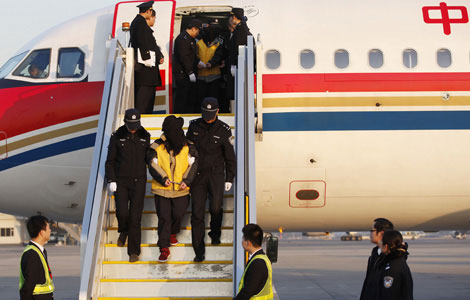China reduces intervention and facilitates business
Updated: 2013-09-26 01:50
By Li Jiabao (China Daily)
|
||||||||
State Council's latest move reduces intervention and facilitates business
The central government announced on Wednesday it will give up more administrative power to let the market better play its role, streamlining procedures for administrative approvals and easing investment controls.
Once the efforts materialize, the State Council will have cut 221 administrative powers since Premier Li Keqiang unveiled an administrative reform initiative in March.
The latest round of reforms consists of cutting 75 approval requirements and procedures, according to a State Council executive meeting chaired by Li on Wednesday.
Investment projects subject to full market competition no longer need approval, but only have to register with government departments.
For projects guided by industrial policies and technical standards, the rights of approval will be transferred to local governments from the central authorities.
The government will also speed up reforms to transform government functions and economic development patterns.
"The moves show that the government has relaxed its control on sectors open to market competition. It's good news for private capital entering such sectors," said Jin Linbo, vice-president of the National Academy of Economic Strategy at the Chinese Academy of Social Sciences.
In August, the State Council announced that strict standards must be used in setting new approval requirements for products, for investments by enterprises and for qualification processes, while restricting authorities from setting approval requirements in industries where the market can properly govern itself.
The central government started the first round of moves to streamline administrative procedures for investment, production and operation in April.
"In the next step, policies for private enterprises will be further relaxed and private investment will be diverted into sectors such as public services and environmental protection, which will break the bottlenecks of these sectors, stabilize economic growth and expand domestic demand as well as keep China's economic growth sustainable," said Zheng Xinli, vice-chairman of the China Center for International Economic Exchanges and former deputy director of the Communist Party of China Central Committee's Policy Research Office.
Affordable housing
The meeting also pointed out problems in building affordable housing projects, such as shortage of funds and lack of supporting facilities.
It stressed the importance of accomplishing this year's government subsidized housing target, calling it "a task that has to be completed".
Subsidies from the central government will be increased, while multiple funding channels to support the construction of affordable housing projects are being studied.
Regulations will be introduced to standardize and encourage the building, management and operation of affordable houses while transparent policies will be set up for public rental housing, according to the release.
Most Viewed
Editor's Picks

|

|

|

|

|

|
Today's Top News
China to improve policies for overseas investment
Li Tianyi jailed for 10 years for gang rape
China reduces intervention and facilitates business
Xi promotes 'mass line' campaign
UN resolution on Syria's chemical weapons urged
Youth short on safe sex awareness
Death toll rises to 328 in SW Pakistan's quake
Trending news across China
US Weekly

|

|













